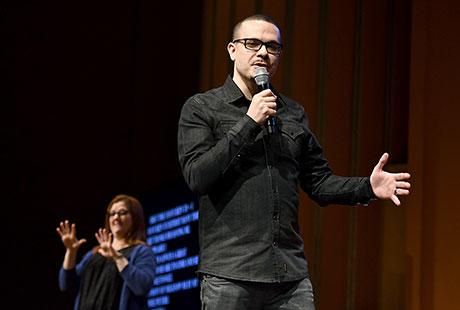In front of a sold-out Rackham Auditorium, writer and civil rights activist Shaun King took the stage and told the audience he was not there to inspire them.
“I believe that in a lot of ways, you’re already inspired — that you’re frustrated, that you’re angry, that there’s still hope in you. I don’t think you need me to inspire you. Tonight, I’m really here to teach you a lesson that I think will give you a new lens to see the world,” he said Monday night.
That lesson came straight from the philosophy of German historian Leopold von Ranke.
King, a 37-year-old senior justice writer for the New York Daily News, said that as von Ranke attempted in the 1800s to tell the history of the world, he realized an interesting phenomenon of the human perspective.
“What troubled him is what troubled me and I realized very little had changed. As he studied the arc of human history, what he saw was most people … believe that human beings are steadily improving. Most people believe that humanity is on a steady progression,” he said.
“For the most part, in the early 1800s, there was very little to debunk this. … But as (von Ranke) laid out the history of humanity he found that sometimes human beings are amazing and cooperative and collaborative and sweet and peaceful. Sometimes human beings are amazing and sometimes they’re not. Humanity is not this steady, inclining progression where people are getting better and better and better and better. Instead, humanity is a series of peaks and valleys.”
The valleys are what King refers to as “dips,” using examples like the 400-year trans-Atlantic slave trade, the tumultuous 1960s fight for civil rights, the Jim Crow era, the explosion of the prison industry and mass incarceration, and, most recently, the spike in police killings and extreme racial divide that exists in America. Humanity’s dips can last for years, decades or even centuries, he said.
It was police shootings that happened nearly two decades ago that spurred King’s activism.

Writer and activist Shaun King said that humanity has undergone a series of peaks and valleys and is currently experiencing what he calls a “dip.” (Photo by Lon Horwedel, Michigan Photography)
As an undergraduate student at Morehouse College in Atlanta majoring in African-American studies and history, King helped organize marches and protests in response to the killing of Amadou Diallo. Several years later, after college, he did the same for Sean Bell. Both men were unarmed and killed by police.
In 2014, several other pivotal incidents sparked King and many others to begin doing more advocacy and social justice work.
“A friend of mine who still knew me — this was 15 years after I finished college — as Shaun the activist, emailed me and said ‘Man, there’s something terrible on Youtube that you have to see,'” King said.
The video turned out to be the recording outside a New York corner store, showing Eric Garner being choked and ultimately killed by police.
“I had never seen a video like what was described. … It shook me. I could not have predicted what opening that email would have done to me. I could not let go of it. I was so deeply disturbed by it and I was so convinced, rightly so, that if I shared it somebody was going to be arrested for what they had done to this man. And that made a lot of sense, right? New York had banned chokeholds for over 10 years. My thought was that someone would be held accountable,” he said.
King said he was devastated that no officer was held liable for Garner’s death. He recounted the deaths of other black men in 2014, including Mike Brown and John Crawford, as well as 12-year-old Tamir Rice, saying he was troubled when he thought that police killings were happening every “two or three weeks,” only to learn that police shoot and kill someone in America every eight hours and that no officers were held accountable for those and other deaths.
“I came here to teach you how Leopold von Ranke viewed history. It’s not this linear progression. It’s a series of highs and lows, peaks and valleys. (I came here) to educate you to the reality that right now we are in a deep dip in the quality of humanity,” King said.
As a solution, King said that when there is an introduction of an innovation that affects the dominant power structure, there’s always a dip in response. He pointed out how the introduction of the 13th Amendment, granting freedom to slaves, resulted in the dip in humanity that produced the worst era of lynching in American history.
Another example of innovation or change was Barack Obama breaking the cycle of white men as presidents in America. With that, he said, came another dip — one that included vicious racism and the most divisive presidential campaign in history.
“Do not make the mistake of thinking we will mysteriously, accidentally find our way out of the dip. That is not how dips work. Dips were built on purpose. Wherever we are right now, it was built this way on purpose by people who mean you harm,” he said
“I’m here to be your partner. I’m here to walk with you and stand with you. As you continue to take bold steps, I have your back. I care about you. I love you. I appreciate you.”
King’s address was part of U-M’s monthlong Rev. Dr. Martin Luther King Jr. Symposium, one of the largest celebrations of MLK’s legacy in the country. The program was hosted by the university’s Office of Academic Multicultural Affairs.
By Jeremy Allen
Public Affairs

